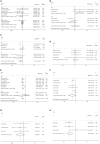Comparison of Survival and Safety Between Total Omentectomy and Partial Omentectomy for Gastric Cancer: A Meta-Analysis
- PMID: 35004832
- PMCID: PMC8739222
- DOI: 10.3389/fsurg.2021.708545
Comparison of Survival and Safety Between Total Omentectomy and Partial Omentectomy for Gastric Cancer: A Meta-Analysis
Abstract
Background: The greater omentum can limit abdominal inflammation and act as a protective cushion, but it is always involved in dissemination of gastric cancer. The purpose of this meta-analysis was to compare the survival and safety between total omentectomy and partial omentectomy for gastric cancer. Methods: Two investigators independently conducted a systematic search of PubMed, Embase, CNKI, and Cochrane Library ranging from January 2000 to November 2020. The pooled odds ratio (ORs) and weighted mean difference (WMD) with the 95% confidence interval (95% CI) were used to assess perioperative and survival parameters. Results: A total of 2,031 patients in 11 studies (574 patients in the partial omentectomy group and 1,457 patients in the total omentectomy group) were included. The results found shorter operation time (WMD = -25.584; P = 0.000) and less intraoperative blood loss (WMD = -47.301; P = 0.050) in the partial omentectomy group, compared to total omentectomy. There were no significant differences in terms of incidence of complications (OR = 0.770; P = 0.164), blood transfusions rates (OR = 0.269; P = 0.161), time to first flatus (WMD = 0.160; P = 0.345), hospital stay (WMD = -1.258; P = 0.087), and number of harvested lymph nodes (WMD = 1.265; P = 0.662). For the disease-free survival (OR = 0.80; P = 0.381) and overall survival, there were no statistical differences between the two procedures. Conclusions: The partial omentectomy could reduce operation time and trended to decrease intraoperative blood loss. And the survival in patients with partial omentectomy seemed to be comparable to that of patients with total omentectomy.
Keywords: gastric cancer; partial omentectomy; safety; survival; total omentectomy.
Copyright © 2021 Zhang, Liu, Chen, Jin, Hu and Yang.
Conflict of interest statement
The authors declare that the research was conducted in the absence of any commercial or financial relationships that could be construed as a potential conflict of interest.
Figures



References
-
- Van Cutsem E, Dicato M, Geva R, Arber N, Bang Y, Benson A, et al. The diagnosis and management of gastric cancer: expert discussion and recommendations from the 12th ESMO/World Congress on Gastrointestinal Cancer, Barcelona, 2010. Ann Oncol. (2011) 22(Supplement 5):v1–9. 10.1093/annonc/mdr284 - DOI - PubMed
Publication types
LinkOut - more resources
Full Text Sources

